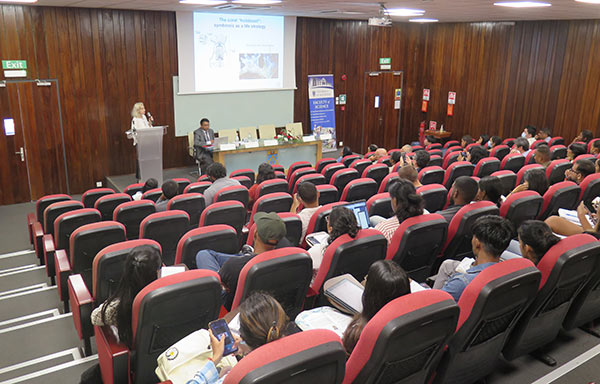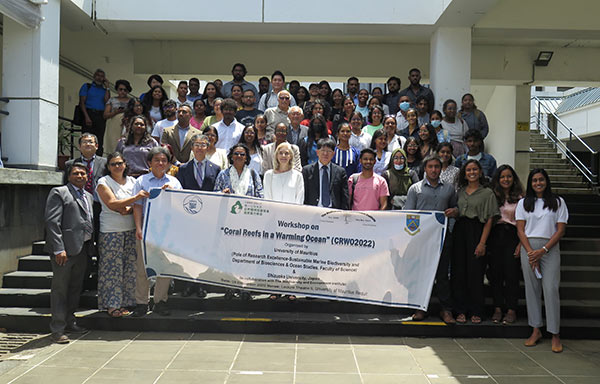Workshop on "Coral Reef in a Warming Ocean" is held in Mauritius; The Authorized Public Trust 'MOL Mauritius International Fund for Natural Environment Recovery and Sustainability'
On Thursday, December 8, 2022, Shizuoka University, which received a grant from the Authorized Public Trust "MOL Mauritius International Fund for Natural Environment Recovery and Sustainability" (the Fund)(Note 1), in collaboration with the University of Mauritius(UoM) which is a partner in the same research project, held a workshop on latest research topics on "Coral Reef in a Warming Ocean" at UoM.
About 100 people attended the event. The participants included governmental authorities such as Ms. Meera Satischandra KOONJUL, Director of Fisheries, Ministry of Blue Economy, in Mauritius, and personnel from the Embassy of Japan to Mauritius among others. Academic officials, including Dr. Minu BHOWON, Dean of the Faculty of Science, and Dr. Deepeeka KAULLYSING, head of Dept. of Biosciences & Ocean Studies, Faculty of Science, UoM, were also on hand. Scientific presentations were delivered by Appointed Professor Beatriz E. CASARETO, Appointed Professor Yoshimi SUZUKI, Professor Taketomo FUJIWARA from Shizuoka University, and Dr. Ranjeet BHAGOOLI, Associate Professor, Dept. Biosciences & Ocean Studies, Faculty of Science, UoM.
The workshop reported the latest research results, such as the mechanisms by which corals in Mauritius can adapt to their environment and how the reefs themselves may recover although they are being affected by global warming and human activities (Note 2)
Active discussions and many positive comments from participants were received during presentations, stating that presentations based on scientific findings, were effective in sharing the latest information with many stakeholders, and also raised expectations for the significance of the joint research conducted by the present Trust Fund and for its future activities.
MOL will continue to support activities to protect the environment in Mauritius, such as the conservation of coral reefs, through grants from the Fund.


Participants had an opportunity for exchange after the research presentations.
(Note 1) For details on the Fund, please refer to the following website.
The Authorized Public trust "MOL Mauritius International Fund for Natural Environment Recovery and Sustainability"
(Note 2) Summary of research results presented.
- From Appointed Professor Beatriz E. CASARETO (project leader): Reports that the pink pigment response is not an infectious disease but is caused by environmental factors such as low salinity, rising seawater temperature, and elevated ammonia levels, and that the tissues turn peach-purple because corals express chromoproteins, which help to reduce oxidative stress. Expression of chromoproteins in tissue lesions is considered to be one of the corals' defense responses. In addition to supplying photosynthetic products (mostly carbohydrates) from zooxanthellae, corals need to prey on pico- and nano-sized (less than 0.02 mm) plankton to incorporate proteins. It is found that bleached corals have changes in feeding behavior due to starvation: branched corals under high temperature stress have a large decrease in feeding rates, but bleached massive corals as Porites spp. show higher plankton uptake at high seawater temperatures compared to branch coral and may be more resistant to high-temperature stress.
- From Appointed Professor Yoshimi Suzuki: Reports that the adaptation of corals to high seawater temperature and other environmental stresses, various chemicals (fluorescent proteins, glycerol, etc.) produced under such stress conditions support the life of the coral and represent the first defense line in the coral immunity.
- Professor Taketomo Fujiwara: Talks about the characterization of Brevundimonas spp. a bacterium that produced astaxanthin, and discuss its possible role in keeping the health of the coral.
- Dr. Ranjeet Bhagooli: Introduces a theoretical concept and the use of the PAM (Pulse Amplitude Modulated) to measure the photosynthetic capacity of zooxanthellae host by corals.
[MOL Group Five Sustainability Issues]
MOL Group will contribute to realizing a sustainable society by promoting responses to sustainability issues, which are identified as social issues that must be addressed as priorities through its business.
In particular, We expect this initiative to contribute the realization of "Environment-Conservation for Marine and global environment," and "Human & Community-Contributing to the growth and development of people and communities."



